|
Elite Fan
Joined: Oct 2001
Posts: 39,200
|
Quote:
Berlin Interview: Ethan Hawke & Julie Delpy On Jesse And Celine & The Making Of Linklater’s ‘Before’ Trilogy
by Jessica Kiang - February 15, 2013 11:11 AM
It will surprise no one who followed the film’s extremely positive reception at Sundance earlier this year, that Richard Linklater's “Before Midnight” (our review here) has been creating quite a stir on the other side of the pond following its European premiere at the Berlin Film Festival. With many of the journalists we met citing the film as one of their favorites of the festival so far, we got to sit down in a small group with stars and co-writers Julie Delpy and Ethan Hawke for what proved to be a fairly riotous interview, in which, while they both maintain repeatedly how unlike their onscreen counterparts they are, certainly the chemistry of old friends was there in spades.
The pair jostle and joke and talk over each other in a very endearing way -- we’ve tried to catch a flavour of that below, as they discuss the film’s gestation, their writing process and address some common misconceptions about how “Before Sunrise,” “Before Sunset” and “Before Midnight” came to be the beloved suite they are. Mild spoilers ahead.
So are we going to check in with Celine and Jesse every 9 years from now on?
Julie Delpy: Oh, I don’t know… I think Rick [Linklater] is going to outlive both of us. It’s kind of disturbing to do these films, time wise, I mean. We joke about it all the time, about death, but one day it won’t be so funny. Though I’m probably less scared of death now than I was in my 20s..
Ethan Hawke: Eh? It was all you talked about in your 20s and it’s all you talk about now.
So how do you think you have changed as people since the first film?
EH: Well, Julie’s become a passionate Muslim, she’s dedicated her life to Allah…
JD: Don’t joke about that ****! That’s the only thing you can’t joke about of all subject matter. Just say I’m a devoted nun.
EH.: Would be awesome if that was true though, if you came in here…
JD: No don’t joke about this! Don’t even say the word Allah. You could get in trouble.
EH: Why not, it’s a beautiful word…
JD: Well I do say "Inch Allah" all the time so… Anyway with the first film, we weren’t friends, we were just meeting.
EH: So we liked each other a lot better.
JD: Yeah, we loved each other then. But now we don’t like each other.
EH: [serious for a moment] Just like the characters, our relationship is deepening. We’ve now written three films together -- that’s an incredibly intimate thing to do.
JD: Yes, when we work we really open ourselves to all our thoughts all our feelings, we express a lot of things to really find something very true. We have to dig through a lot of stuff. I mean we’re not a couple in real life, we’ve never been… we never even…well, if we did I have forgotten…
You do have a kind of sex scene in this one...
EH: Finally! Been trying to get in her pants for 20 years.
JD: Yeah, but it doesn’t really get that far.
EH: You know, I somehow didn’t notice that when you come back in to tell me that you don’t love me...
JD: I take off my underwear?
EH: Yeah, you still have your underwear in your hand.
JD: I made that on purpose, because I think it’s funny, I mean you’re fighting, but with your underwear in your hand [hears Ethan mumble something]. What? You were going to make a joke?
EH: Yeah, I was going to make a joke. [thinks about it] Wasn’t funny.
How much of you is there in Jesse and Celine?
EH: We work together to try create something that feels authentic and to do that a wonderful thing to do is to blur the lines between character and performer to the extent that some people believe that Julie and I are couple.
JD: You know, in the second film it almost hurt us, I think some people thought we were really together and they thought "Oh, they are not really acting you know? They’re just together and in love." A lot of people thought like that.
EH: Yeah, they feel the movies were improvised, we were just being ourselves, but the truth is whenever that happens it means that what we were doing worked, it’s a victory.
JD: It’s a compliment.
Tell us about creating a sense of urgency when there’s no train to catch, no plane schedule to meet.
EH: That was the most difficult thing about the third one were no "ticking clock" and the fact that they’ve now known each other so long why would they [only] now be telling the other person something? I could have a great idea about my best friend but he would have already told her that…
JD: We discussed a lot the moment with the [story of the] cat in the bag in the car, but then I realized that even though we spend our life talking to each other, memories and stuff…I realize that there’s a lot of stuff I’ve never said to my boyfriend of 9 years, about my past. There’s a lot of things people omit to say. But we didn’t want too much of that.
EH: Finding the right balance is difficult.
JD: Right, because you can’t have it all the time like in the first films where they’re discovering each other. The first two films are very similar in a way, it’s about flirting and catching up or meeting. This one is totally different: it’s about being together. The stakes are different.
EH: The answer [to the urgency question] was the fight. That was a problem in the air that could be explosive to the relationship and it was happening on this day specifically. And saying goodbye to the son.
So what’s the secret of a happy relationship?
EH: Oh, we have that but we’re not telling. We know it completely but unfortunately we can’t tell you.
JD: Maybe I should write this self-help book, and bull**** people about the perfect relationship, and how I’ve figured it all out.
EH: The perfect Valentines day gift for your family - "Julie Delpy On Love."
How do you write dialogue?
JD: We work on it, the three of us together and we work on it over and over and over -- it’s like sanding a stone.
EH: It starts out really bad, it really does. It starts out with ideas, as in we would like to talk about this idea and this idea and then you start going, "Well, how would that come up naturally, why would somebody say that just then?"
JD: When we see that it’s not smooth, we write it until it becomes smooth. Especially writing dialogue because we don’t do any improvisation in these films at all. Not a word.
Who came up with the idea to introduce outside characters into the film?
EH: All three of us did. The idea was we needed to see them in a community of some sort, so we decided one couple should be the same age, one couple should be younger, at the beginning of life, beginning of a love affair and [there should be someone] who had lost a spouse -- it just seemed like a great opportunity to get the themes of the movie in play. And it also gave Jesse and Celine a chance to talk to other people because otherwise why would we say a lot of things that are in there, what happened to us, how did we meet…
JD: I mean the little passive/aggressive game that I play with him about the bimbo and stuff it’s funny if there’s other people watching, otherwise it wouldn’t happen.
Are you similarly passive/aggressive with each other in real life?
EH: [punches Julie lightly] Nah, we’re aggressive/aggressive.
With three of you writing, when disagreements arise, who "wins"?
EH: Rick has a rule, if any one of us disagrees, it’s out. We all have veto power so that creates an environment that is really open. If Julie has an idea she’s passionate about it and we don’t like it and she’s still passionate about it, she has to win us over about why it’s in there. And that usually makes the idea better. And the same is true for all of us.
JD: We have to give a reason of why it’s so important,that it’s not just thrown in …. what does it bring to the scene, to the characters, to the story?
Is any one of you the most insistent?
EH: Well, Rick is ultimately the one who’s going to edit the film so ultimately he has final say in everything. But he’s the most undictatorial person.
JD: We visit with him locations, we pick them with him. He’s like, [goes into a laid-back drawl] "Do you like that restaurant at the end?"
EH: Or "What do you think, would it be cool to pull out [camera angle] here?" So many directors have this authorship where "It’s my film, it’s my film." He wants everybody to feel "It’s our film." The best work comes out of people collaborating, bouncing off each other. And you have to be tremendously confident to do that. He never does anything he doesn’t want to do, but he likes to let the best idea float to the top.
Do you each focus on your own characters at the writing stage?
JD: I don’t focus on Celine…we write each others’ lines all the time…I remember once somebody told me on “Before Sunset,” ‘How can you let Ethan write such a condescending line as 'You’ll do great as a mother…'” And I wrote that line. A girlfriend of mine said, “That’s the only line that’s offensive, how could you let Ethan write it?” and I said it was me.
EH: Like she says to me in this movie, “Tou have sex the exact same way every time” and that is something that my wife has said to me. In fact, I’m really really proud of being part of movie that has such a full, 3-dimensional female character.
JD: And you know what’s so funny is that you might write that line and I would write the next line and then Rick would write the next like, so it’s really a patchwork.
EH: We all have our hands in the clay in that way. And it means, most romantic movies feel in some way like they have a masculine agenda or feminine agenda. “Sleepless in Seattle” feels like it has a feminist take on a feminine idea of what romantic love should be. Tons, thousands of movies where you see Eva Mendes on a Trans Am in a bikini, that feels like a masculine idea of what sexuality should be. And whats fun about this is…
JD: It’s Julie Delpy topless?
EH: Well, what Rick did when we were really young was to pick two young people who were desperate to write, desperate to be creative in other ways, he found us and encouraged us...
JD: In the audition he asked me “Do you write” and I said “Oh, I wrote a screenplay” so he wanted that.
EH: He wanted that. He wanted people like that and so in way the movie has become genderless because my voice is very strong in it and Julie’s voice is very strong in it and Rick is just continually trying to get out of the way and make us both smarter.
JD: And you know Rick is ten years older than us, he has a little distance on what we are at. If I had the ten year distance on the last film I could see a little bit the bigger picture. We are very passionate in our process...
EH: ...and he is very dispassionate...
JD: And it’s the perfect balance, two passionate people -- male and female also -- and one distanced person over the whole thing.
|
Source: Berlin Interview: Ethan Hawke & Julie Delpy On Jesse And Celine & The Making Of Linklater’s ‘Before’ Trilogy | The Playlist
Julie Delpy and Ethan Hawke on how it feels to be back together for Before Midnight 
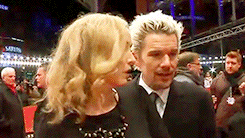 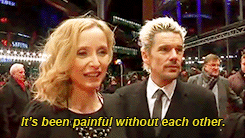
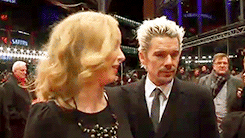 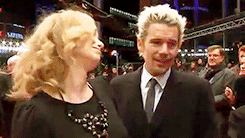
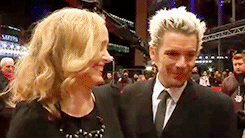 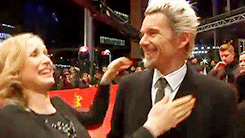 Julie on what’s after Before Midnight
Julie on what’s after Before Midnight
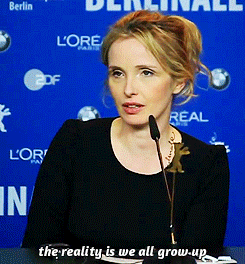 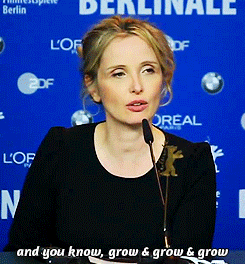
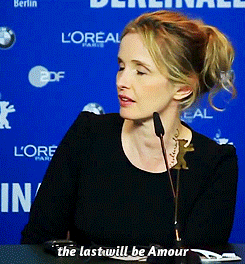 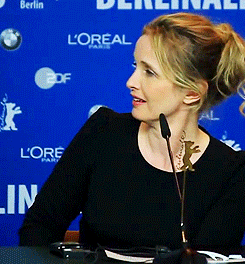 Ethan on what’s after Before Midnight
Ethan on what’s after Before Midnight
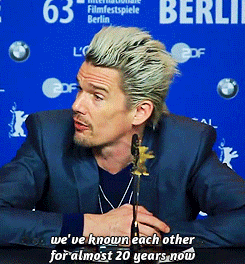 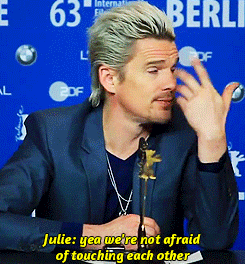
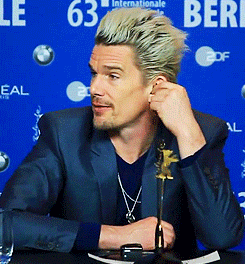 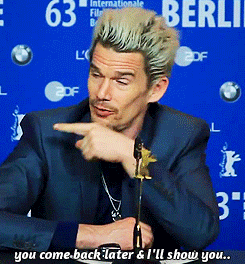
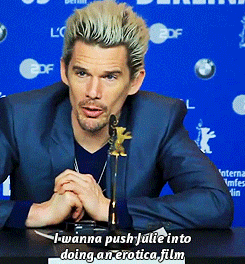 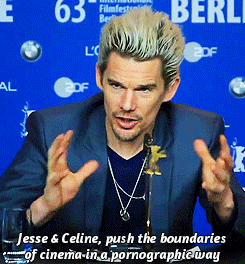
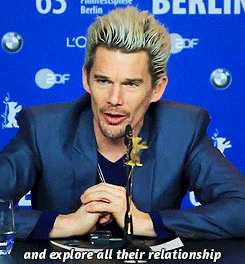 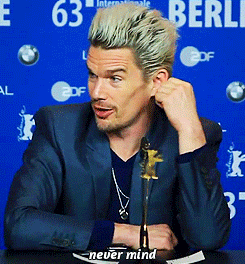 Source: x
Source: x
|